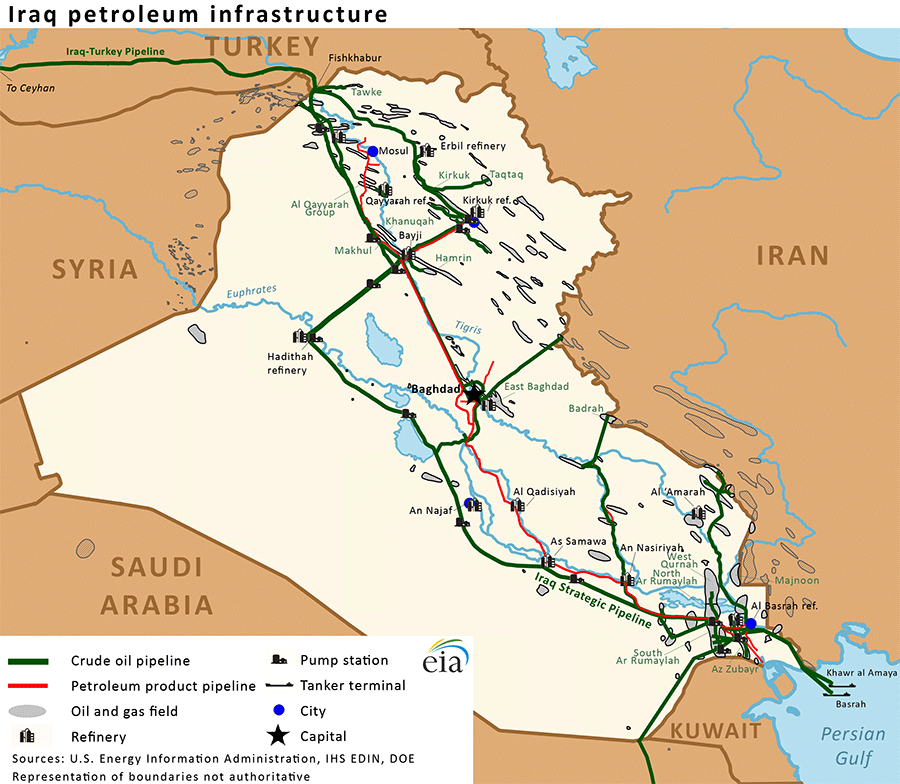U.S. court allows oil sales from Kurdistan
Iraq’s Kurdish Semi-autonomous region is increasing international oil sales without the approval of Iraq’s central government. The U.S. Court of Appeals for the Fifth Circuit in New Orleans dismissed the Kurdistan Regional Government’s (KRG) bid to overturn an earlier ruling against a planned sale of oil to an unidentified buyer in the U.S., reports Reuters.
Iraq’s federal government filed the lawsuit in a U.S. court last year in order to halt the sale of 1 million barrels of oil from the Kurdistan region, during an ongoing dispute between the central government and the semi-autonomous region to the north. The tanker was stuck offshore for six months before sailing to Israel where it was sold.
Kurdistan’s Ministry of Natural Resources said Tuesday that the ruling would force the Iraqi oil ministry to drop its “baseless” lawsuit.
“Although the KRG believes that the case should have been dismissed earlier, and for different reasons, the state of play remains the same: there is no prohibition on the KRG’s export of oil to the United States or elsewhere, and the KRG will continue to export hydrocarbons as the Iraqi constitution permits.”
Increasing exports
The Kurdistan Regional Government also announced Tuesday that it plans to increase the oil it exports to Turkey by up to 200 MBOPD, reports the Al Bawaba Business Journal. An official from the northern Iraqi parliament said that Kurdistan would continue to sell its oil independently of the central government as problems between the two governments persists.
“Including Kirkuk oil, we currently deliver 700 MBOPD to Turkey,” the official said. “We suppose [that number] will rise to 900 MBOPD by the end of this year.”
“Iraq violates the (oil) agreements by not sending the Kurdistan region’s share of the national budget,” said Delshad Shaban, the deputy head of the oil and gas committee in the Kurdish parliament. He added that Baghdad aimed to use the budget issue as a tool of oppression against the KRG.
In December of last year, the central government in Baghdad reached an agreement with the KRG whereby Kurdistan committed to provide 250 MBOPD to the Iraqi state run State Oil Marketing Organization (SOMO), which SOMO would then sell. Kurdistan also agreed to facilitate SOMO’s export of 300 MBOPD of oil from fields in Kirkuk, which could not be exported through federal territory due to security risks.
In exchange for its help in securing SOMO’s oil, the KRG was to be compensated $500 million to alleviate near-term financial strain, as well as see its monthly portion of the Iraqi budget reinstated, plus an additional $100 million a month to pay the salaries of Kurdish Peshmerga fighters opposing ISIS in the north.
“I do not believe that the central government will implement the budget act of 2016 and send Kurdistan’s $11 billion share,” said Shaban.
Developing a successful model
Former Ambassador to Iraq Christopher Hill told Oil & Gas 360® that any lasting solution for Iraq would require agreement on oil. “Any successful Iraq needs to be able to distribute the fruits of those resources throughout the country, including with the Kurdish and the Sunni areas,” said Hill. “A good distribution of the proceeds from oil and gas will provide the glue to keep Iraq together.”
“Iraq has had a very difficult time distributing the hydrocarbon wealth, and I believe the sticking point has been Sunni Iraqis who, in many cases, feel they would be better off outside of Iraq. If that happens, they also won’t be able to receive anything from the Shia areas [like hydrocarbon wealth]. It will be a major challenge, but a very necessary challenge, to make sure they have proper distribution.”
Iraq production expected to drop
The Iraqi central government recently sent out a letter to independent oil companies operating inside the company asking them to develop conservative spending plans for 2016. The pressure of low oil prices mixed with fighting a war against the Islamic State has made further development of the country’s energy industry increasingly difficult.
“Because of the drop in our oil-sales revenues, the Iraq government has sharply reduced the funds available to the Ministry of Oil,” Iraqi official Abdul Mahdy al-Ameedi worte. “This will…reduce the funds available for the reimbursement of petroleum costs to our contractors.” Ameedi added that the oil ministry did not expect lower funding to “reduce production from the levels that were [already] stipulated.”
An official at a European company told The Wall Street Journal that production levels could drop without investment in future development. In a worst-case-scenario, the company could declare force majeure in order to back out of projects without legal liability because of forces beyond its control.
“We are trying to clarify whether they are going to just shred the 2016 budget or are also going to defer payments for monies already owed,” said another executive working in the country.



